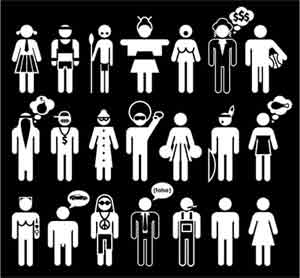 “Germans are all punctual but don’t have a sense of humor, people from Great Britain do and always have their tea at 5 pm in the afternoon, Italian men pick up girls all the time, the French eat baguette, cheese and frogs’ legs. Women can’t drive cars and men simply cannot listen, young people are irresponsible because they get drunk all the time and old people are terribly inflexible.” You could easily continue this list about any nationality, age, gender, political or sexual orientation. Stereotypes are pre-fabricated phrases to generalize about certain groups of people. But how are they generated? Do they have any practical use in daily life or are they just wrong and useless? Are their fixed for all time once they have been established or can they change over time? In this show, we try to find some answers to these questions about stereotypes.
“Germans are all punctual but don’t have a sense of humor, people from Great Britain do and always have their tea at 5 pm in the afternoon, Italian men pick up girls all the time, the French eat baguette, cheese and frogs’ legs. Women can’t drive cars and men simply cannot listen, young people are irresponsible because they get drunk all the time and old people are terribly inflexible.” You could easily continue this list about any nationality, age, gender, political or sexual orientation. Stereotypes are pre-fabricated phrases to generalize about certain groups of people. But how are they generated? Do they have any practical use in daily life or are they just wrong and useless? Are their fixed for all time once they have been established or can they change over time? In this show, we try to find some answers to these questions about stereotypes.
Emma Cuevas-Saunders, who is an ERASMUS student from Spain, has been studying and doing a practical training in Germany for about a year now. She tells us about her experiences with stereotypes in Spain and how prejudices about Germans almost prevented her from going abroad. We also learn that Spain, known as a nation marked by national pride, actually is divided into many different sub-groups, which each have stereotypes about the other groups. However, as Emma says, this is a rather positive aspect, because it demonstrates Spanish diversity and these stereotypes are also used as a conversation starter. But first, she tells us, that all Spaniards have discovered a new pastime: They like to sit on the beach and guess the nationality of the tourists, but perhaps this is also a stereotype?
absolutely Mexican-American:
In our second category we talk with Susana, who has her roots in Mexico, lives in the United States and currently is studying in Germany for one year. Although she is probably the expert on this topic, we thought she tends to underestimate the popularity of her two “home countries”, thinking that they are not very much liked in the world. We learn that stereotypes really can change over time, if people like Susana have the courage to go abroad, make their own experiences and afterwards, tell people about it.
absolutely Austrian:
We speak to Dr. Nicole Slupetzky from “Volkshochschule Salzburg” (institute of adult education) about the challenges connected with harmful stereotypes and the opportunities of friendly ones. While friendly stereotypes can provide you with conversation topics and sometimes make these conversations run more smoothly, harmful stereotypes can be responsible for hate and racism. Nicole emphasizes that it is important to talk about these stereotypes, to learn about the affected groups and sometimes even to laugh about these statements together. We discuss that, of course, we shouldn’t believe every stereotype we hear, because they can be produced in many different ways, by the media, the family or even education.
So long…stay tuned!
The host of this show is: Dr. Laurent Borgmann
Editor: Peter Kron
The next show will be coming to you on 25 July from Anne Fox in Denmark.
